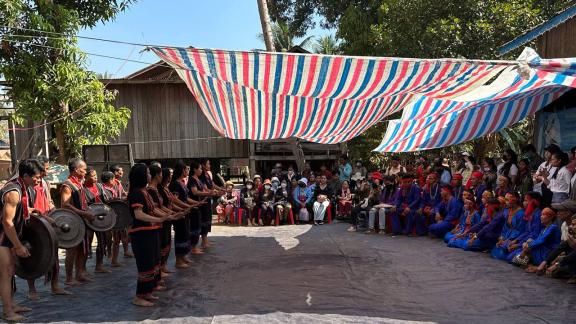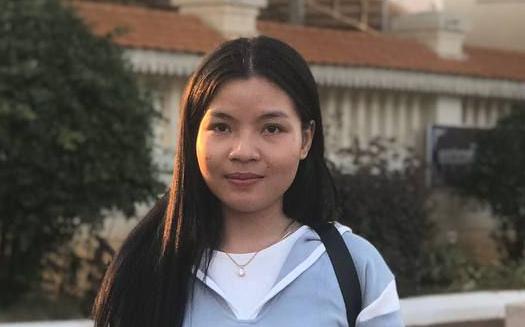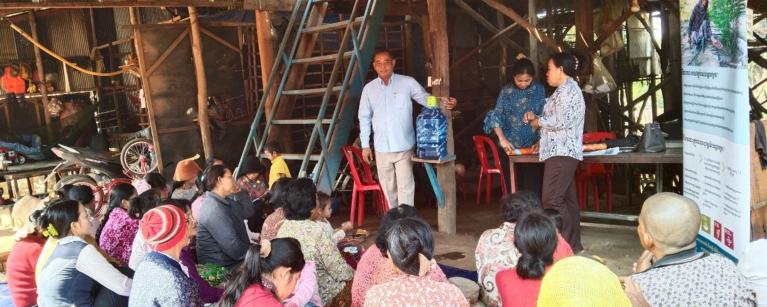Facebook and Telegram are valuable tools for promoting gender equality in water management. They provide information and facilitate communication and collaboration for women protecting water resources.
Oxfam and partner organizations jointly celebrated International Women's Rights Day, International Day of Action for Rivers, and World Water Day 2023 under the theme 'Jointly Manage Your Water Resources, Protect Your Life-Giving Source of Water.'
The event was held on March 13-14, 2023, at the theater of Ratanakiri’s Provincial Department of Fine Arts in Banlung city, and a field visit was made to riverine communities along the Sesan river in Veun Sai district.
The event was attended by 156 participants from different groups, including indigenous peoples (IPs), people with disabilities (PWD), and non-binary individuals, to jointly celebrate and acknowledge the role and efforts of women river defenders and other marginalized groups in protecting water resources.

As the crowd was filled with performances, music, storytelling, and documentaries, Chhoun Lan felt that she was not alone in the work of river protection, realizing that different groups were working towards the same goal. This reflects one of Oxfam’s feminist principles, stating that 'nothing about us without us,' given that the Mekong's water resources are interlinked with other tributary rivers where millions of people rely on for survival.
In her community of Kampong Phluok in Siem Reap, Lan's fishery community, Lan has updated her communication technology skill to boost effectiveness of work. Lan and her community use Telegram to connect with other members and report illegal fishing and flooded forest land grabbing in the fishery conservation zone to the authorities. Additionally, she uses the Facebook platform to post her activities despite knowing little about it, she said. Recently, Lan was selected as the chair of the Women Leadership Network on Fisheries at the Women Leadership Forum on Fisheries held in November 2022.
While not familiar with Zoom or Google Meet like younger generations, Lan uses Facebook's Messenger for online training and education in improving skills and knowledge needed to effectively manage and protect the river.
“I think the role of women is important, and with technology to lead in the community and for the protection of the river, it is very helpful,” she said.
As one of the conservationists, Lan is proud that her work has actually made an impact on the community, as she observed there increased community’s awareness on rule and regulation of community and significantly decreased illegal fishing and flooded forest land grabbing her area.
Oxfam has trained and supported women in local communities in their work for the protection of water and fisheries sources. As part of the Inclusion Project Phase II, Oxfam's inclusive Mekong water governance focuses on building capacities of communities and CSOs to engage in the water governance decision-making process and continue to access water resources and ecosystem services to sustain their livelihoods.

Ream Sreyrath- a leader of youth group from Stung Treng province. Photo provided by Sreyrath.
Ream Sreyrath, a 22-year-old youth volunteer from the Culture and Environment Preservation Association (CEPA), a partner organization of Oxfam, is a participant and leader of a dancing team from Stung Treng. Sreyrath has been volunteering and leading a youth group with CEPA for two years, working on fishery community, forestry, and youth-related issues.
Throughout her work, Sreyrath's team uses Telegram to connect for monthly meetings and create activity plans. Additionally, the team joins virtual meeting platforms like Zoom, as younger generations are more likely to adapt to new technologies and participate in training or capacity-building sessions.
“Mekong River and Tonle Sap are like the same bloodstream. When the Mekong River has problems, it also affects Tonle Sap”
As the invited guest for the event, His Excellency Ngin Nel, Ratanakiri's deputy provincial governor, praised the work of the Royal Government and its partnership with civil societies regarding the role of women in society.
“The government's success is not without women's [contributions]. Cambodian women have developed their capacity to play important roles in both national and sub-national level leadership and in the private sector”
According to His Excellency, Cambodia's top leadership includes one deputy prime minister, three ministers, and 75 under-secretaries of state who are women.
Ms. Sao Phalla, deputy director of the Ratanakiri Department of Women's Affairs, said that the ministry is encouraging women to assume more leadership roles within the government sector and providing capacity-building training to women.
"As of today, the government and non-governmental organizations in Cambodia are working hard to bring these issues to everyone, men and women, to receive justice for economic, social, and cultural rights, and to eliminate all issues against women," she said.
At the conclusion of his speech, His Excellency Ngin Nel reminded the crowd that the advocacy for gender equality is not yet finished, and more work needs to be done.
"This event is to remind women to participate more. More than 100 years of advocacy is only a success to this level, but it is not enough. We need to do more," he said."
